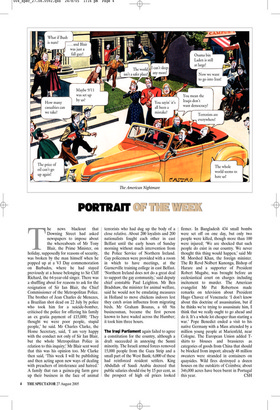PORTRAIT OFTHEWEEK T he news blackout that Downing Street had asked
newspapers to impose about the whereabouts of Mr Tony Blair, the Prime Minister, on holiday, supposedly for reasons of security, was broken by the man himself when he popped up at a VJ Day commemoration on Barbados, where he had stayed previously at a house belonging to Sir Cliff Richard, the 64-year-old singer. There was a shuffling about for reasons to ask for the resignation of Sir Ian Blair, the Chief Commissioner of the Metropolitan Police. The brother of Jean Charles de Menezes, a Brazilian shot dead on 22 July by police who took him for a suicide-bomber, criticised the police for offering his family an ex gratia payment of £15,000; ‘They thought we were poor people, stupid people,’ he said. Mr Charles Clarke, the Home Secretary, said, ‘I am very happy with the conduct not only of Sir Ian Blair, but the whole Metropolitan Police in relation to this inquiry;’ Mr Blair sent word that this was his opinion too. Mr Clarke then said, ‘This week I will be publishing and then acting upon new ways of dealing with preachers of intolerance and hatred.’ A family that ran a guinea-pig farm gave up their business in the face of animal terrorists who had dug up the body of a close relative. About 200 loyalists and 200 nationalists fought each other in east Belfast until the early hours of Sunday morning without much intervention from the Police Service of Northern Ireland. Gay policemen were provided with a room in which to have meetings, at the Garnerville training college in east Belfast. ‘Northern Ireland does not do a great deal to support the gay community,’ said deputy chief constable Paul Leighton. Mr Ben Bradshaw, the minister for animal welfare, said he would not be emulating measures in Holland to move chickens indoors lest they catch avian influenza from migrating birds. Mr Graham Boanas, a 6ft 9in businessman, became the first person known to have waded across the Humber; it took him three hours.
The Iraqi Parliament again failed to agree a constitution for the country, although a draft succeeded in annoying the Sunni minority. The Israeli armed forces removed 15,000 people from the Gaza Strip and a small part of the West Bank; 6,000 of these had reinforced resident settlers. King Abdullah of Saudi Arabia decreed that public salaries should rise by 15 per cent, as the prospect of high oil prices looked firmer. In Bangladesh 434 small bombs were set off on one day, but only two people were killed, though more than 100 were injured; ‘We are shocked that such people do exist in our country. We never thought this thing would happen,’ said Mr M. Morshed Khan, the foreign minister. The Rt Revd Nolbert Kunonga, Bishop of Harare and a supporter of President Robert Mugabe, was brought before an ecclesiastical court on charges including incitement to murder. The American evangelist Mr Pat Robertson made remarks on television about President Hugo Chavez of Venezuela: ‘I don’t know about this doctrine of assassination, but if he thinks we’re trying to assassinate him, I think that we really ought to go ahead and do it. It’s a whole lot cheaper than starting a war.’ Pope Benedict ended a visit to his native Germany with a Mass attended by a million young people at Marienfeld, near Cologne. The European Union added Tshirts to blouses and brassieres as categories of goods from China that should be blocked from import; already 48 million sweaters were stranded in containers on quaysides. Wild fires destroyed a dozen houses on the outskirts of Coimbra; about 346,000 acres have been burnt in Portugal this year. CSH











































 Previous page
Previous page